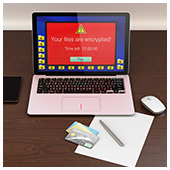 Ransomware is on the rise, but falling victim to one is not the end of the world. You can try some of these ransomware decryptors and maybe one of them will work. These are especially useful against automated “zombie” ransomware types.
Ransomware is on the rise, but falling victim to one is not the end of the world. You can try some of these ransomware decryptors and maybe one of them will work. These are especially useful against automated “zombie” ransomware types.
The state of ransomware in 2021 so far
Businesses need to deal with ransomware both from outside and within. On one hand, there are more cybercriminals trying to infiltrate your network. On the other hand, careless and unknowing staff can easily let ransomware enter your network. For instance, employees may be tricked into providing their access credentials in phishing sites, or they may click links to websites that upload ransomware downloaders onto their machines.
The statistics are sobering. Ransomware cost businesses more than $75 billion per year. Over the past two years, ransomware attacks have increased by over 97%. And compared to the first two months of 2017, ransomware campaigns that were initiated from phishing emails increased by 109% in the same span of time this year.
According to studies, there will be a ransomware attack targeting a business every 11 seconds in 2021. That is up from every 14 seconds in 2019, and every 40 seconds in 2016. And the trend is that the rate will continue to increase over the years.
Zombie ransomware is easy to defeat
Not every type of infection is targeted to individual organizations. Some infections may result from self-propagating ransomware strains, while others may come from cyberattackers who are hoping targets become so scared that they pay up before doing any research on how dated the strain is and how to remove it.
No matter what the circumstances of your infection are, always check the following lists to see whether free decryption tools have been released to save you a world of hurt:
- Kaspersky Lab’s No Ransom list
- Avast’s free decryption tools
- Trend Micro’s Ransomware File Decryptor
- Heimdal Security’s Free Ransomware Decryption Tools
Prevention
But even when you can get your data back for free, getting hit with ransomware is no walk in the park. There are essentially three basic approaches to prevent ransomware:
- First, train your employees about what they should and shouldn’t open when browsing the web and checking email.
- Second, back up your data as often as possible to quarantined storage. As long as access to your backed-up data is extremely limited and not directly connected to your network, you should be able to restore everything in case of an infection.
- Finally, regularly update all your software solutions (operating systems, productivity software, and antivirus). Most big-name vendors are quick to patch vulnerabilities, and you’ll prevent a large portion of infections just by staying up to date.
Whether it’s dealing with an infection or preventing one, the best option is to always seek professional advice from seasoned IT technicians. It’s possible that you could decrypt your data with the tools listed above, but most ransomware strains destroy your data after a set time limit, and you may not be able to beat the clock. And even if you do, you probably won’t have the expertise to discern where your security was penetrated.
Don’t waste time fighting a never-ending stream of cyberattacks — hand it over to us and be done with it. Call us today to find out more.



